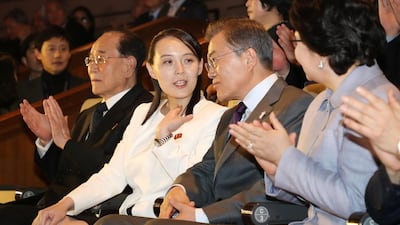Kim Jong-un, North Korea’s leader, praised South Korea as 'very impressive', state media reported on Tuesday, after his sister and other senior government officials returned from their landmark visit to the Winter Olympics.
The state-run KCNA news agency published a report on Mr Kim meeting the delegation on Monday following its return to Pyongyang.
“After receiving the delegation’s report, Kim Jong-un expressed satisfaction over it and said that very impressive were the features of the south side which specially prioritised the visit of the members of the DPRK side who took part in the Winter Olympics,” KCNA said, adding the North Korean leader “expressed thanks” to Seoul.
South Korea’s hosting of the Winter Olympics has sparked sudden rapprochement across the Demilitarised Zone after months of sky-high tensions over Pyongyang’s rapidly advancing nuclear weapons programme and missile tests.
After months of rebuffing invitations from South Korea to attend the Olympics, Mr Kim did an about-face in a New Year speech.
The North has since sent its athletes to the South Korean ski resort of Pyeongchang, along with cheerleaders and performers, and dispatched a diplomatic delegation that included Mr Kim’s sister, Kim Yo-jong.
She became the first member of the North’s ruling dynasty to set foot in the South since the 1953 ceasefire of the Korean War.
She shook hands several times with the South’s president, Moon Jae-in, cheered a unified ice hockey team with him, and conveyed her brother’s invitation to a summit in Pyongyang.
The KCNA report suggested the North Korean leader wished to build on that rapprochement, saying he felt it “is important to continue making good results by further livening up the warm climate of reconciliation and dialogue”.
The report added that Mr Kim “set forth in detail the orientation of the improvement of the North-South relations and gave important instructions to the relevant field to take practical measures for it,” without detailing what those measures were.
The KCNA report is the first official reaction from Mr Kim – the third generation of his family to rule the North – since his sister’s charm offensive in Pyeongchang.
Every detail of her visit as the key member of a diplomatic delegation to the South’s Winter Olympics was scrutinised, from the clothes she wore and her facial expressions to the bag she was carrying and her handwriting.
Her visit divided South Koreans, with some hoping it might usher in a real opportunity for reconciliation while others angrily burned the North Korean flag and criticised Mr Moon for being too soft on Pyongyang.
The speed of the Olympics-driven rapprochement has been remarkable.
Pyongyang’s Olympic diplomacy has also highlighted differences between Seoul and its key protector the United States over how to handle the reclusive regime and its nuclear weapons programme.
Washington insists that Pyongyang must take steps towards denuclearisation before any talks can begin, while Mr Moon – whose parents fled from the North in a US evacuation during the war – has long argued for closer involvement to bring it to the negotiating table.

